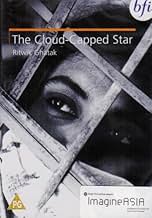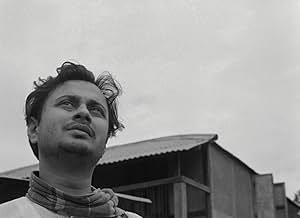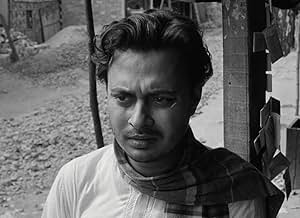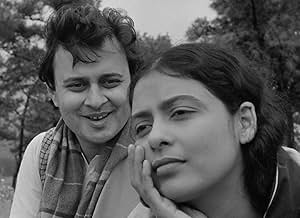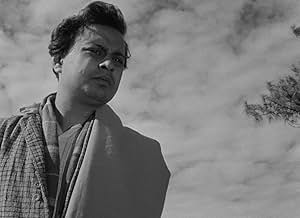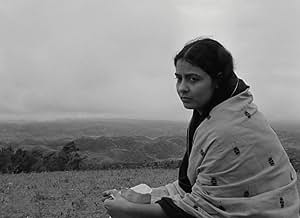IMDb RATING
7.8/10
3.5K
YOUR RATING
A selfless young woman (Supriya Choudhury) sacrifices her own happiness for her unappreciative family.A selfless young woman (Supriya Choudhury) sacrifices her own happiness for her unappreciative family.A selfless young woman (Supriya Choudhury) sacrifices her own happiness for her unappreciative family.
- Awards
- 1 nomination total
Ranen Ray Choudhury
- Baul singer
- (as Ranen Chowdhury)
Featured reviews
The independence of India in August 1947 resulted in the partition of Bengal, a trauma etched in the minds of the people whose lives were changed forever. Nowhere is this upheaval better portrayed than in the films of Bengali director Ritwik Ghatak. An active Marxist who began his career in the Communist People's Theater, Ghatak's films never achieved widespread popularity but he is now considered to be one of the top Indian directors of the last half of the 20th century. His best known film, The Cloud-Capped Star, the first in a trilogy examining the economic effects of partition, is a powerful story about a young Indian women who sacrifices her education and marriage in order to hold her family together. Ghatak's inspiration for the character was a woman he saw at a bus stop whose beaten down appearance struck him as being typical of Bengali refugees.
Neeta (Supriya Choudhury) is the youngest daughter of a refugee family from East Pakistan who lives in a middle class home near Calcutta. Neeta is a college student whose brother Shankar (Anil Chaterjee) is a layabout, an aspiring singer who lives off the family while practicing his art and dreaming of a career on the concert stage. Neeta believes in her brother and loves him deeply but has to constantly fend off the complaints of both parents about his laziness. Neeta also has an attractive sister Gita (Gita Ghatak) and a brother Mantu (Dwiju Bhawal) who is also a promising student.
When her father (Bijon Battacharya) has a serious accident, Neeta is forced to give up her studies and find a job and Mantu gives up school to work in a factory. The father is dismayed by a world that no longer has a place for poetry or idealism and falls into a state of hopelessness. Neeta is a good-hearted young woman, but one who fails to consider her own needs and puts off plans for marriage with Sanat (Niranjan Ray), an intellectual studying for a Phd. Sanat, unwilling to wait for her, becomes infatuated with Neeta's sister Gita and they marry to Neeta's dismay. Even though Shankar eventually finds success in Bombay, Neeta's strain in having to hold the family together leads to serious illness and the family's burdens only increase.
The Cloud-Capped Star is an angry film and often bleak, but sudden bursts of sitar music and joyous singing by Shankar lighten the tone. Although the film can be overly melodramatic and unevenly acted, it contains an overriding humanism that is reminiscent of Satyajit Ray and the neo-realist films of the 40s and 50s. Ghatak's raw passion and compelling characters make it easy to overlook its flaws and the result is a tribute to the human spirit and a deeper understanding of the tragedy that partition brought to India.
Neeta (Supriya Choudhury) is the youngest daughter of a refugee family from East Pakistan who lives in a middle class home near Calcutta. Neeta is a college student whose brother Shankar (Anil Chaterjee) is a layabout, an aspiring singer who lives off the family while practicing his art and dreaming of a career on the concert stage. Neeta believes in her brother and loves him deeply but has to constantly fend off the complaints of both parents about his laziness. Neeta also has an attractive sister Gita (Gita Ghatak) and a brother Mantu (Dwiju Bhawal) who is also a promising student.
When her father (Bijon Battacharya) has a serious accident, Neeta is forced to give up her studies and find a job and Mantu gives up school to work in a factory. The father is dismayed by a world that no longer has a place for poetry or idealism and falls into a state of hopelessness. Neeta is a good-hearted young woman, but one who fails to consider her own needs and puts off plans for marriage with Sanat (Niranjan Ray), an intellectual studying for a Phd. Sanat, unwilling to wait for her, becomes infatuated with Neeta's sister Gita and they marry to Neeta's dismay. Even though Shankar eventually finds success in Bombay, Neeta's strain in having to hold the family together leads to serious illness and the family's burdens only increase.
The Cloud-Capped Star is an angry film and often bleak, but sudden bursts of sitar music and joyous singing by Shankar lighten the tone. Although the film can be overly melodramatic and unevenly acted, it contains an overriding humanism that is reminiscent of Satyajit Ray and the neo-realist films of the 40s and 50s. Ghatak's raw passion and compelling characters make it easy to overlook its flaws and the result is a tribute to the human spirit and a deeper understanding of the tragedy that partition brought to India.
Gorgeous cinematography, attractive cast, fantastic music. Seriously, I wish I could find the soundtrack for this one. The voices are like musical instruments, full of feeling, and whether we see a performance as a break in the action or hear music and sound effects in the background, it always has an aching, haunting sense to it. Ranen Roychowdhury's eternal river song was a real highlight. All of it works perfectly for the story, which is about a daughter (Supriya Choudhury) who sacrifices her own aspirations in order to support her parents, two brothers, and sister. What held me back from truly loving the film, however, was in just how much suffering this woman endures. My goodness, talk about misery porn.
There are just too many times while in a conversation about her hardships, this young woman slowly turns to the camera with a dreamy look on her face and says something beatific. Meanwhile, her poetry-quoting father has his head in the clouds and is then bed-ridden with an injury, her mother harps on her mercilessly, her older brother shamelessly borrows money from her while devoting all his time to music, her sister has her eye on her boyfriend, and her young brother's focus is on soccer. They are all seriously annoying.
Aside from the qualities of the music that I mentioned, I liked how it helped me understand in a subtle way why this young woman would continue to support her brother (Anil Chatterjee) for the ideal of his art. It's beautiful, and we can perceive that. Unfortunately, much of her other motivation felt like too much for a person to take - even a gentle soul like this one.
When her sister (Gita Ghatak) and her boyfriend (Niranjan Ray), who she's both supported, begin seeing one another without feeling conflicted at all, and then she reacts without saying a word - and even allows her sister to take her bangles - it was the straw that broke the camel's back for me. And that, of course, was not nearly the end of the suffering she has to endure.
The problem with the story is that while there is plenty of escalation - her woes and martyrdom continue to mount throughout the film - there is just not enough transformation. Deep into the film she mentions "I never protested the wrongs done to me. That's my sin," recognizing that she should have stood up for herself, but it's mild and in a victim blaming herself kind of way. There is never a true moment of realization that her own family is cruelly taking advantage of her, or a hint of bitterness. You could say that at the end, she's realized something while knowing that she is tragically too late, but by that point, over two hours in, it was too little, too late for this viewer.
The melodrama is moving and emotional, but I think would have been more powerful had the main character not been the "idealized Bengali woman," dutiful to the point of annihilation. I also wish it had been a little more explicit in its commentary about the Partition of Bengal, which I understand was one of director Ritwik Ghatak's main concerns, though I confess that my own ignorance might have caused me to miss unspoken references and cues. Overall though, it's worth seeing for its visual and aural beauty.
There are just too many times while in a conversation about her hardships, this young woman slowly turns to the camera with a dreamy look on her face and says something beatific. Meanwhile, her poetry-quoting father has his head in the clouds and is then bed-ridden with an injury, her mother harps on her mercilessly, her older brother shamelessly borrows money from her while devoting all his time to music, her sister has her eye on her boyfriend, and her young brother's focus is on soccer. They are all seriously annoying.
Aside from the qualities of the music that I mentioned, I liked how it helped me understand in a subtle way why this young woman would continue to support her brother (Anil Chatterjee) for the ideal of his art. It's beautiful, and we can perceive that. Unfortunately, much of her other motivation felt like too much for a person to take - even a gentle soul like this one.
When her sister (Gita Ghatak) and her boyfriend (Niranjan Ray), who she's both supported, begin seeing one another without feeling conflicted at all, and then she reacts without saying a word - and even allows her sister to take her bangles - it was the straw that broke the camel's back for me. And that, of course, was not nearly the end of the suffering she has to endure.
The problem with the story is that while there is plenty of escalation - her woes and martyrdom continue to mount throughout the film - there is just not enough transformation. Deep into the film she mentions "I never protested the wrongs done to me. That's my sin," recognizing that she should have stood up for herself, but it's mild and in a victim blaming herself kind of way. There is never a true moment of realization that her own family is cruelly taking advantage of her, or a hint of bitterness. You could say that at the end, she's realized something while knowing that she is tragically too late, but by that point, over two hours in, it was too little, too late for this viewer.
The melodrama is moving and emotional, but I think would have been more powerful had the main character not been the "idealized Bengali woman," dutiful to the point of annihilation. I also wish it had been a little more explicit in its commentary about the Partition of Bengal, which I understand was one of director Ritwik Ghatak's main concerns, though I confess that my own ignorance might have caused me to miss unspoken references and cues. Overall though, it's worth seeing for its visual and aural beauty.
If I have to chose one movie in my life then it would be this. Ultimate cinematic experience would be an under statement as it is more than that. I can think of Ritwik as the Indian answer to Stanley Kubrick. Meghey Dhaka Tara is like Clockwork Orange made by an equally eccentric and obscure genius, whose impact is appreciated much after his death. The contrast is, unlike Kubrick, very few people know about him as the rating shows here where as, it should have been in the cannon of every cinephile around the world. It is the responsibility of those few of us who have watched it, to spread it. I would like to spend some time here discussing what is so special about the movie.
First of all it is a movie that celebrates beauty. The beauty of nature as captured by some of the breath taking shots of trees that I have ever seen in a movie, the beauty in the affection between the brother and sister eating together side by side, or the face of Neeta gleaming under the sun when Sanat arrives or the beauty captured in Neeta's sister in front of the mirror. It also portrays the beauty in people's mind through many side characters like the compassion of the strict shop keeper. Yet, this beauty both in natural and in human spirit is in sharp contrast with the abject poverty and the bleak refugee colony. Nature plays an intricate role in many of his cinemas like Ajantrik and it often highlights the character and gives it also a context, done in the most effective and subtle way.
The second quality of this movie is the usage of classical music so deliberately for mood change. It reminds me of Kubrick. But here it is done in an much more open fashion. It creates a sense of happiness (read beauty) and often there is a sudden inflection or a discontinuity as if to remind the audience the harsh reality. (there is also a piece of great folk song as well).
The third quality of the movie is it's simplicity and honesty to the subject. Here the movie almost attained the quality of a real documentary. The effect of partition on the Bengali people have never been captured so authentically as been done here, the characters so identifiable, the story so representative and the settings so familiar.
The fourth and true to the identity of the genre it belongs to, this movie is a cinematographic excellence. If Kubrick is fascinated with back-motion and checkered pattern, then Ritwik has his play with frames and off center photography. Here each frame tells more than one story and a face is never complete with the surroundings and is part of it, not the center of it. Also there are other aspects of it like there are meaning to be understood by relating the context and what been showed, something Satyajit is very good at, Ritwik great at and been taken to extreme by Mrinal Sen.
The fifth and most touching part of it is the storyline. It is at the end of the day a very human movie. It talks about individual family and individuals in normal relationship in normal acts of life and in normal background. In that way it touches your heart seeing the struggle and the suffering. It does so without being too apparent or getting too sentimental.
The greatness of this movie lies in achieving all the above qualities in one work of art. It appeals to all the senses and linger long in your mind. One viewing is not enough to comprehend it fully like all great movies as there are many things in it that get revealed only after repeated viewing
First of all it is a movie that celebrates beauty. The beauty of nature as captured by some of the breath taking shots of trees that I have ever seen in a movie, the beauty in the affection between the brother and sister eating together side by side, or the face of Neeta gleaming under the sun when Sanat arrives or the beauty captured in Neeta's sister in front of the mirror. It also portrays the beauty in people's mind through many side characters like the compassion of the strict shop keeper. Yet, this beauty both in natural and in human spirit is in sharp contrast with the abject poverty and the bleak refugee colony. Nature plays an intricate role in many of his cinemas like Ajantrik and it often highlights the character and gives it also a context, done in the most effective and subtle way.
The second quality of this movie is the usage of classical music so deliberately for mood change. It reminds me of Kubrick. But here it is done in an much more open fashion. It creates a sense of happiness (read beauty) and often there is a sudden inflection or a discontinuity as if to remind the audience the harsh reality. (there is also a piece of great folk song as well).
The third quality of the movie is it's simplicity and honesty to the subject. Here the movie almost attained the quality of a real documentary. The effect of partition on the Bengali people have never been captured so authentically as been done here, the characters so identifiable, the story so representative and the settings so familiar.
The fourth and true to the identity of the genre it belongs to, this movie is a cinematographic excellence. If Kubrick is fascinated with back-motion and checkered pattern, then Ritwik has his play with frames and off center photography. Here each frame tells more than one story and a face is never complete with the surroundings and is part of it, not the center of it. Also there are other aspects of it like there are meaning to be understood by relating the context and what been showed, something Satyajit is very good at, Ritwik great at and been taken to extreme by Mrinal Sen.
The fifth and most touching part of it is the storyline. It is at the end of the day a very human movie. It talks about individual family and individuals in normal relationship in normal acts of life and in normal background. In that way it touches your heart seeing the struggle and the suffering. It does so without being too apparent or getting too sentimental.
The greatness of this movie lies in achieving all the above qualities in one work of art. It appeals to all the senses and linger long in your mind. One viewing is not enough to comprehend it fully like all great movies as there are many things in it that get revealed only after repeated viewing
10davidals
The visionary Bengali filmmaker Ritwik Ghatak peers into the future, and sees nothing but disintegration - succeeding at multiple levels, CLOUD-CAPPED STAR humanizes this bleak vision, by locating the drama in a Bengali family, but everything occurring is something of a howl of outrage at what had become of his divided homeland.
The central figure in this sprawling melodrama (with some coincidental resemblances to European new wave and neo-realism) is Nita, the eldest daughter in a once-middle class, intellectual family, driven by partition into refugee status in the slums of Calcutta. Varied family members react in different opportunistic ways to their reduced status, and their need to survive, all of which takes an extreme toll on Nita, who ultimately becomes the family's sole breadwinner. The performances throughout are excellent - Supriya Choudhury as Nita is riveting, and Niranjan Roy is particularly strong as Sanat.
Throughout, Ghatak boils human nature and the survival instinct down to the most ruthless basics: this is a compelling and visionary film, but there is virtually no room for lofty ideals or sentimental altruism in the world created here - mourn what one must, and do what one must do to survive. Sentiment and ideals are - in this film - luxuries, and from the cruelty of such a truism, Ghatak has created one of cinema's great, vital tragedies.
Ghatak claimed few Western cinematic influences - like Jean-Luc Godard in France and Nagisa Oshima in Japan, his primary concerns were historical and political, and also technical - how to alter cinema to express those concerns in accessible language? For Ghatak the solution was found in using outdoor locations, natural sound, idiosyncratic editing, and a minimum of the flash seen in Bollywood or Hollywood - CLOUD-CAPPED STAR is bleak, absolutely gripping, tragic and infuriating. As drama, it would definitely rank as one of the more obscure global masterpieces out there (there has yet to be an official US release on VHS or DVD), rarely seen or commented upon. This is highly unfortunate - as a film of moral/social outrage, this rivals Bresson; its' overall feel for the everyday reminds one of Italian neo-realism; it's willingness to experiment boldly evokes Godard or Oshima; in it's concerns with the status of women (another of the many themes explored here), it evokes Naruse, Sirk or Mizoguchi.
Ghatak's own biography is one of great tragedy; one could possibly read the discretely enraged hopelessness of this film as an extension of his own, and see this as a drive that would have to produce at least one masterpiece (his later SUBARNA-REKHA is also very much worth a look), even as it brought him to a premature end. For all of its' bleakness, CLOUD-CAPPED STAR is absolutely compelling - any cinephile (or student of history) would do well to see it.
The central figure in this sprawling melodrama (with some coincidental resemblances to European new wave and neo-realism) is Nita, the eldest daughter in a once-middle class, intellectual family, driven by partition into refugee status in the slums of Calcutta. Varied family members react in different opportunistic ways to their reduced status, and their need to survive, all of which takes an extreme toll on Nita, who ultimately becomes the family's sole breadwinner. The performances throughout are excellent - Supriya Choudhury as Nita is riveting, and Niranjan Roy is particularly strong as Sanat.
Throughout, Ghatak boils human nature and the survival instinct down to the most ruthless basics: this is a compelling and visionary film, but there is virtually no room for lofty ideals or sentimental altruism in the world created here - mourn what one must, and do what one must do to survive. Sentiment and ideals are - in this film - luxuries, and from the cruelty of such a truism, Ghatak has created one of cinema's great, vital tragedies.
Ghatak claimed few Western cinematic influences - like Jean-Luc Godard in France and Nagisa Oshima in Japan, his primary concerns were historical and political, and also technical - how to alter cinema to express those concerns in accessible language? For Ghatak the solution was found in using outdoor locations, natural sound, idiosyncratic editing, and a minimum of the flash seen in Bollywood or Hollywood - CLOUD-CAPPED STAR is bleak, absolutely gripping, tragic and infuriating. As drama, it would definitely rank as one of the more obscure global masterpieces out there (there has yet to be an official US release on VHS or DVD), rarely seen or commented upon. This is highly unfortunate - as a film of moral/social outrage, this rivals Bresson; its' overall feel for the everyday reminds one of Italian neo-realism; it's willingness to experiment boldly evokes Godard or Oshima; in it's concerns with the status of women (another of the many themes explored here), it evokes Naruse, Sirk or Mizoguchi.
Ghatak's own biography is one of great tragedy; one could possibly read the discretely enraged hopelessness of this film as an extension of his own, and see this as a drive that would have to produce at least one masterpiece (his later SUBARNA-REKHA is also very much worth a look), even as it brought him to a premature end. For all of its' bleakness, CLOUD-CAPPED STAR is absolutely compelling - any cinephile (or student of history) would do well to see it.
If Satyajit Ray is the virtuoso of Indian cinema, Ghatak is the maverick. His films aren't as polished or subtle as Ray's, but he takes bold chances. Most blatantly in the sound design, with startling (and often beautiful) use of music, ambient noise, reverb, and effects that are almost sci-fi. Perhaps only Lynch is as distinctive in the employment of audio techniques. Not all of Ghatak's gambles pay off. Take, for instance, his insistence on casting the goofy Bijon Bhattacharya in most of his films. Bhattacharya's performance here isn't quite as damaging as his turn in THE GOLDEN THREAD, but it's easily the weakest aspect of the film. However, the primary focus is on Nita (Supriya Choudhury), the girl whose family walks all over her, and resent her for it in the process. As her brother chides her: "You'll suffer. Those who suffer, suffer forever." The family is a microcosm of Ghatak's obsession, the damage caused by the Partition, commenting on those who exploit the weak, and those who let themselves be exploited. It's high melodrama, but like Sirk, is done so artfully and effectively that it's a wonder to behold, with breathtaking images, unforgettable moments, and that idiosyncratic audio field.
Did you know
- TriviaEtoile cachée (1960) is part of the Criterion Collection, spine #993.
- GoofsWhen Nita meets her former lover at the tree near the pond (after about 90 minutes), a microphone is visible in the top left corner.
- Quotes
Baul singer: [singing] I wasted all my good days, Now, in bad times, I've come to the river's edge, Boatman, I don't know your name, Who shall I call out to? Who shall I call out to? Oh, my heart, who will take you across? There is a boat but no boatman, There is no one on the river bank, There is no one on the river bank...
- ConnectionsFeatured in The Story of Film: An Odyssey: New Directors, New Form (2011)
- How long is The Cloud-Capped Star?Powered by Alexa
Details
- Release date
- Country of origin
- Official site
- Languages
- Also known as
- The Cloud-Capped Star
- Production company
- See more company credits at IMDbPro
- Runtime
- 2h 6m(126 min)
- Color
- Sound mix
- Aspect ratio
- 1.33 : 1
Contribute to this page
Suggest an edit or add missing content


